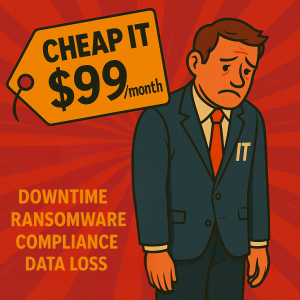Irvine Businesses Trust OCMSP
What is a HIPAA compliant website, and why is this important to healthcare organizations?
Understanding HIPAA Compliant Websites and Their Importance
A HIPAA-compliant website ensures that any information exchanged between a healthcare provider and its users is secure and confidential, as mandated by the Health Insurance Portability and Accountability Act (HIPAA). This is crucial for any healthcare organization because it protects sensitive patient information, commonly referred to as Protected Health Information (PHI).
What Makes a Website HIPAA Compliant?
To achieve compliance, a website must incorporate several security measures:
Encryption
: Data must be encrypted during transmission and at rest to prevent unauthorized access. Secure Connections: Websites must use HTTPS protocols to secure the connection between patients and the site. Authentication and Authorization: Robust user authentication measures ensure that only authorized individuals access PHI. Audit Controls: Implement systems for tracking and logging access to sensitive data. Why Is Compliance Important?
Patient Trust: Ensuring privacy safeguards builds patient confidence in your services, enhancing your organization's reputation.
Legal Obligations: Non-compliance can lead to significant fines and legal issues that can harm both financially and reputationally.
Data Integrity: A compliant website helps preserve the integrity of patient data, reducing the risk of information breaches.
By integrating these practices, healthcare organizations not only meet legal requirements but also foster trust and reliability with their patients.
Why Implement HIPAA Compliance Early in Web Development?
Incorporating HIPAA compliance measures at the outset of web development is crucial for several reasons, each benefiting the organization in significant ways.
1. Cost Efficiency:
Early integration of HIPAA protocols can prevent expensive overhauls later. When compliance measures are embedded from the start, the need for major revisions—often both time-consuming and costly—diminishes.
2. Robust Security Foundation:
By prioritizing HIPAA compliance initially, developers establish a strong security framework. This proactive approach minimizes vulnerabilities and reduces the risk of data breaches, ensuring patient information is protected against unauthorized access.
3. Streamlined Development:
Embedding compliance within the core infrastructure streamlines the entire development process. Developers who start with a HIPAA-compliant mindset create solutions that naturally align with privacy regulations, reducing the likelihood of needing significant adjustments.
4. Regulatory Assurance:
When a website or application is built with HIPAA standards in mind from the beginning, it ensures ongoing adherence to regulations. This commitment not only satisfies legal requirements but also fosters trust with patients and partners.
5. Avoidance of Legal Repercussions:
Finally, failing to integrate HIPAA compliance from the start can lead to serious legal challenges. By ensuring compliance from the get-go, healthcare organizations can avoid penalties and safeguard their reputations.
In conclusion, adopting HIPAA compliance early in the web development process is a strategic move that promotes efficiency, security, and trust, while also protecting the organization from potential legal issues.
What Can Be Done If a Website or Application Was Not Initially Developed with HIPAA Compliance in Mind?
If your website or application wasn't initially designed to meet HIPAA standards, don't worry—there are solutions to get on the right track. Here's what you can do:
Conduct a Security Audit: Enlist experts to perform a comprehensive security audit. This will identify vulnerabilities and areas needing improvement to align with HIPAA requirements.
Plan a Multi-Phase Compliance Strategy: Work on a strategic plan that gradually brings your digital assets into compliance. This approach allows you to prioritize tasks while managing resources effectively.
Implement Best Practices: Adopt industry best practices such as data encryption, access controls, and regular security training for staff to maintain ongoing compliance.
Conclusion
Bringing your website or app into HIPAA compliance is not only feasible but also critical for protecting sensitive information. By taking incremental steps and utilizing expert resources, you can safeguard your digital presence and maintain trust with your users.
What solutions are available to ensure website forms are HIPAA compliant?
When it comes to safeguarding sensitive patient information, having HIPAA-compliant forms on your website is crucial. Here's how you can achieve this by using various solutions:
Customizable Form Builders: Opt for platforms like JotForm, Formstack, or Wufoo that offer HIPAA-compliant plans. These allow you to create and publish forms tailored to your needs while ensuring data security.
Secure Data Transmission: Utilize services that provide encryption for data being transmitted from the form to storage or email systems. This protects patient information as it's delivered to your chosen destinations.
Comprehensive Logging: Implement solutions that offer audit trails. These allow you to track all form submissions and ensure transparency and security checks are in place.
By choosing the right tools and processes, maintaining HIPAA compliance for your website forms becomes straightforward and efficient.
How should a HIPAA compliant website handle links to third-party systems?
Handling Third-Party Links - When designing a HIPAA compliant website, careful consideration must be given to any links that direct users to third-party systems. The priority is ensuring that any data shared, especially through forms, remains secure and is transmitted to systems that also adhere to HIPAA regulations.
Secure Data Transmission - When a user submits information via your website, it's crucial that this data reaches a compliant endpoint. For example, if your website includes a contact form, it's not enough to simply collect the information; where it is sent matters. If the form responses are sent to an email address, the email provider must be HIPAA compliant, such as using Google Workspace (formerly G Suite) with its HIPAA features enabled.
Implementing Compliant Solutions - If your website currently links to systems that aren't compliant, it's important to seek alternatives. Solutions can include:
Switching to HIPAA Compliant Email Hosting
- Use services known for their compliance, like Microsoft Office 365, with HIPAA features activated. Developing Custom Solutions - This might involve building custom forms or applications that meet compliance standards or redesigning processes to enhance security. Choosing Compliant Web Hosting - To maintain overall compliance, ensure your web hosting provider is also HIPAA compliant. Providers like Amazon Web Services (AWS) offer HIPAA compliant hosting.
Collaboration for Compliance - Ensuring your site is free of non-compliant links or systems requires both a meticulous review and potential redesign. This often involves collaboration with web developers well-versed in HIPAA regulations to tailor solutions specific to your needs, thereby maintaining the confidentiality and security of any patient data handled through your website.
What are common mistakes made in HIPAA compliant web development?
Developing HIPAA compliant websites can be challenging, and even small oversights can lead to significant breaches and penalties. Here are some typical mistakes that healthcare providers should avoid:
Skipping SSL Certificates
An SSL certificate is more than just a security measure; it's a cornerstone of HIPAA compliance. By encrypting the connection between your server and users, it protects sensitive data from third-party access. Without an SSL certificate, your website cannot be considered HIPAA compliant.
Overlooking Business Associate Agreements (BAAs)
A Business Associate Agreement (BAA) is essential whenever protected health information (PHI) is handled or stored by third parties. This contract defines the responsibilities of both you and your subcontractors in protecting PHI. If you're starting a HIPAA compliant web development project, ensure a BAA is in place between you and the web developers, as well as any subcontractors involved.
Linking to Non-Compliant Systems
Any form on your website where patients submit information should send that data only to systems that comply with HIPAA standards. For instance, if data is routed to an email service, that service must be HIPAA compliant. Avoid linking to or integrating non-compliant systems, as this could jeopardize the security of patient data.
By being aware of these common pitfalls, healthcare organizations can better navigate the complexities of HIPAA compliant web development, ensuring that patient information remains secure and private.
What is a Business Associate Agreement (BAA) and why is it necessary in HIPAA compliant web development?
A Business Associate Agreement (BAA) is an essential legal contract in the realm of HIPAA-compliant web development. This agreement is crucial because it sets clear terms between healthcare organizations and subcontractors, ensuring that any entity handling Protected Health Information (PHI) adheres to strict privacy and security standards.
What is a BAA?
A BAA is a formal contract outlining the responsibilities and safeguarding protocols that a subcontractor—such as a web design or development firm—must follow when dealing with PHI. This agreement ensures that all parties involved are on the same page regarding the handling, transmission, and storage of sensitive patient information.
Why is a BAA Necessary?
Legal Compliance: HIPAA mandates that healthcare providers form BAAs with any service providers that have access to PHI. This is crucial for mitigating risks and maintaining legal compliance.
Shared Responsibility: A BAA delineates shared duties and obligations, explicitly assigning accountability for data protection between the healthcare entity and the subcontractor, making clear who handles PHI and how.
Trust and Security: By requiring a BAA, healthcare organizations can trust that their partners will uphold the same standards of confidentiality and security, thereby protecting patient data from unauthorized access and breaches.
Risk Management: With a BAA in place, all parties involved have a vested interest in safeguarding PHI, minimizing the potential for data breaches and ensuring swift action when handling any security incidents.
Critical Steps in BAA Implementation
Start Before Development: Before any web development work begins, the healthcare organization must secure a signed BAA from the development partner, laying the groundwork for a secure project.
Involve All Partners: Any subcontractor or third-party collaborator involved in the project should also sign a BAA, ensuring comprehensive coverage of all entities accessing PHI.
In summary, a BAA is not just a formality but a vital component of HIPAA-compliant web development. It protects patient data, aligns partner responsibilities, and fortifies the healthcare provider's compliance efforts.
What interactive communications tools on a website require HIPAA compliance?
To ensure your website meets HIPAA compliance, it's crucial to identify which interactive communication tools may involve the transmission of Protected Health Information (PHI). Here's a breakdown of tools that typically require adherence to HIPAA standards:
Contact Forms: Websites often feature forms for prospective or current patients to reach out. If these forms collect health-related information or personal identifiers, they must be secure.
Appointment and Scheduling Tools: Using online calendars or scheduling services where patients book consultations can involve sensitive data, necessitating HIPAA compliance.
Patient Intake Forms: Allowing patients to submit medical histories or personal information via your site requires stringent data protection measures.
Instant Messaging: Real-time chat features can enhance patient interaction but often involve PHI, meaning they should be secured under HIPAA standards.
Bill Payment Portals: Online billing systems that process patient payments need to ensure financial and personal data protection.
Interactive Quizzes: Any quiz that requests personal identifiers such as name, contact details, or conditions calls for compliance if it potentially contains PHI.
Implementing these tools means incorporating encryption, secure hosting, and access controls to protect patient information effectively. Always ensure that your website meets the necessary security requirements to comply with HIPAA regulations.
Why is an SSL Certificate Essential for a HIPAA Compliant Website?
An SSL certificate is a crucial component for any website aiming to meet HIPAA compliance standards. It plays a vital role in safeguarding sensitive data and ensuring a secure online environment.
1. Protects Data Transmission:
An SSL certificate encrypts the communication between your server and the user's browser. This encryption keeps sensitive information, such as personal health records, secure from unauthorized interception.
2. Prevents Unauthorized Access:
Without encryption, third parties can potentially hijack data during online transmission. An SSL certificate acts as a barrier, preventing malicious attacks and keeping user information confidential.
3. Builds Trust and Credibility:
Users are more likely to trust websites that display security indicators like the padlock icon or "https" in the URL. This trust is essential for maintaining a professional image and encouraging patient interaction.
4. Legal Compliance:
HIPAA regulations mandate the protection of patient information. An SSL certificate is a technical safeguard that helps meet these legal requirements, reducing the risk of penalties for non-compliance.
In summary, an SSL certificate is not just a technical feature; it's a fundamental necessity for ensuring compliance and protecting patient privacy.
Secure Your Business with Cybersecurity & HIPAA Compliance
Don’t leave your business vulnerable. Schedule your free IT assessment today and let us protect your data, operations, and reputation
The Hidden Cost Of “Cheap” IT
The Hidden Costs Of Waiting: Why You Can’t Afford To Delay Your Windows 10 Upgrade
Your Vacation Auto-Reply Might Be A Hacker’s Favorite E-mail
7 Questions You Should Be Asking Your IT Provider Every Quarter (But Probably Aren’t)
You've heard it before: You get what you pay for. And when it comes to IT services, that couldn't be more... Read More
Still Using Windows 10? Here's Why Orange County Businesses Need to Act Now If your small business is still using... Read More
You set it. You forget it. You head out on vacation—and your inbox starts replying: "Hi! I'm out of the... Read More
Technology isn't a one-and-done project. It changes fast—and so do the threats that come with it. That's why... Read More








